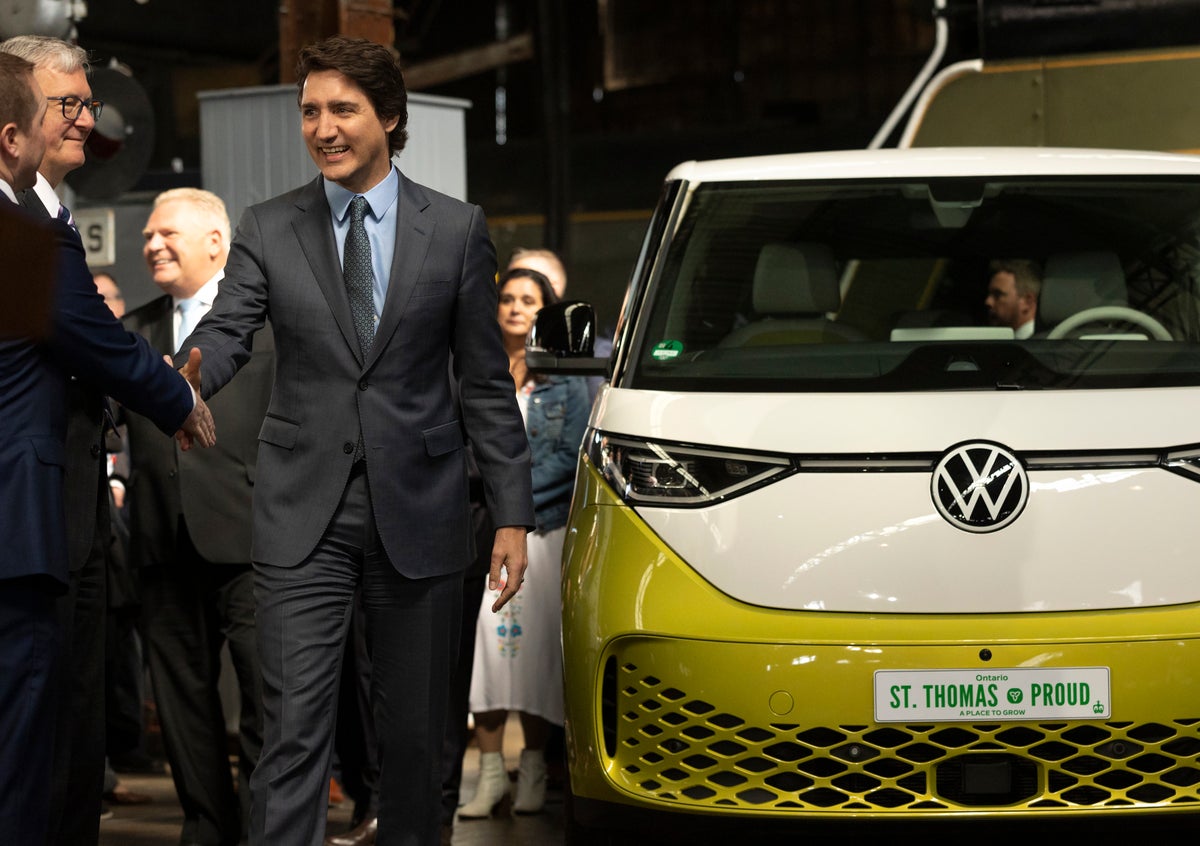
A massive Volkswagen electric battery plant being built in Ontario will create 3,000 jobs and represent a “generational investment” for Canada, Prime Minister Justin Trudeau said Friday.
The German automaker last month announced plans for the plant in the town of St. Thomas, and Trudeau and other government ministers presented details at a news conference at the town’s railway museum Friday. The plans came under criticism this week from opposition lawmakers following revelations that Canada would grant CDN$13 billion (US$9.6 billion) in subsidies to the automaker over 10 years.
Trudeau defended the investment by saying it will create “good careers for years to come in St. Thomas and great middle class jobs right across Ontario and the rest of Canada.”
Volkswagen, the world’s largest automaker, will invest CDN$7 billion (US$5.17 billion) in the “gigafactory,” which will be operated by its company, PowerCo Se. The plant will create up to 3,000 direct jobs, 30,000 indirect jobs and have the capacity to produce batteries for up to one million vehicles a year, government officials said.
The Canadian government will provide Volkswagen with an upfront capital investment of CDN $700 million (US$516.9 million) and production subsidies for every battery the company makes and sells that could range between CDN$8 billion (US$5.9 billion) and CDN$13 billion (US$9.6 billion) over a decade.
Those subsidies will not be in the form of tax credits but are designed to match what Volkswagen could have received if it had built the new plant in the United States. The subsidies will disappear or be reduced if the U.S. supports within the Inflation Reduction Act are eliminated or phased down.
“Everyone wanted this, so yes, we put up a lot of money,” Trudeau said. “Money that’s going to come back in economic investments very quickly.”
Ontario Premier Doug Ford said the province will invest CDN$500 million (US$369.3 million) in direct incentives to the company and spend hundreds of millions more to build roads, utilities, police stations and fire stations in the area.
A federal government release said the plant will generate about CDN$200 billion (US$147.7 billion) in value.
Pierre Poilievre, leader of the Conservative Party of Canada, has criticized the deal's subsidies as a giveaway of Canadian resources.
“This money belongs to Canadians,” Poilievre, who leads the official opposition, Tweeted earlier. “Not to a foreign corporation. Not to Justin Trudeau.
“How much of Canadians’ money is he giving to this foreign corporation? How many jobs? How much is the cost per job?”
The facility will be built on a 1,500-acre site with construction set to begin in 2024 and production expected to begin by 2027.
Frank Blome, chief executive officer of PowerCo SE, said the factory join ones in Germany and Spain.
“It has the great potential to become our biggest one in the world,” said Blome. “I’m pretty sure it will serve as an accelerator for future jobs, and this will develop the current economy.”
Blome said Volkswagen and its subsidiary companies aim to produce more than 25 new elective vehicles by 2030.
“Most of them will be equipped with batteries made in St. Thomas,” he said. Canada was attractive to Volkswagen because the country has the minerals and metals needed for the batteries plus an abundance of clean power.
Andy Hira, a political science professor at Simon Fraser University in Vancouver, and director of the Clean Energy Research Group, said as gas vehicles are phased out, it’s important for countries like Canada to stake their place in new production methods.
“The race is on for different countries to try to capture parts of this industry,” he said. “History tells us that if you’re first to market, then you have a much better chance to capture the employment in those jobs and create clusters around them.”
Hira said while “it’s a positive move” to invest in projects like the battery factory, governments can’t just write a blank check.
“You would really want to scrutinize it deal by deal,” he said.
This will be the second electric vehicle battery factory in Ontario. Last year, automaker Stellantis and South Korean battery-maker LG Energy solution announced they were building a facility in Windsor, Ontario, with a CDN$5-billion (US$3.7 billion) price tag.







